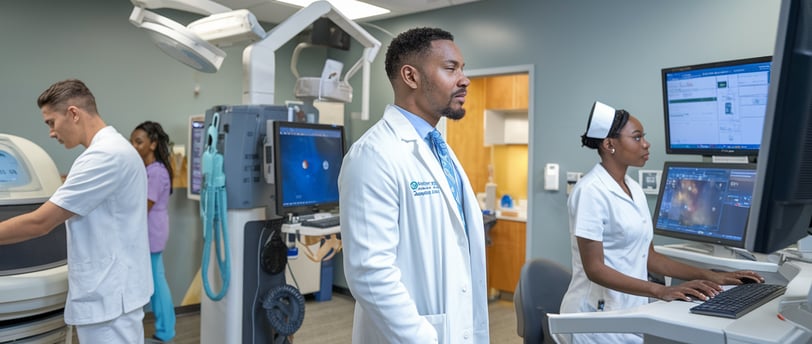How AI is Revolutionizing Health Care
Artificial intelligence (AI) is revolutionizing health care by enhancing diagnostics, personalizing treatments, and accelerating drug discovery. Machine learning algorithms analyse medical imaging to detect diseases like cancer earlier, while tools like IBM Watson tailor therapies to individual genetic profiles. AI slashes drug development timelines by predicting molecular interactions, as seen with COVID-19 treatments. Hospitals use AI for predictive analytics and automating tasks like EHR management, while wearable devices (e.g., Apple Watch) enable remote patient monitoring. Despite ethical challenges like data privacy and algorithmic bias, the AI health care market is projected to hit $187 billion by 2030, driven by innovations in robotic surgery and telemedicine. By augmenting not replacing doctors, AI empowers precision care and efficiency, shaping a future where collaboration ensures ethical, equitable advancements.


How AI is Revolutionizing Health Care
The health care industry is undergoing a seismic transformation, and artificial intelligence (AI) is at the heart of this revolution. From speeding up drug discovery to enabling personalized treatment plans, AI is reshaping how we diagnose, treat, and manage diseases. In this blog post, we’ll explore the ground breaking ways AI is improving patient outcomes, reducing costs, and empowering medical professionals. Let’s dive in!
1. Revolutionizing Diagnostics with AI
AI’s ability to analyse vast datasets quickly and accurately is transforming diagnostics. Machine learning algorithms can now detect patterns in medical imaging (like X-rays, MRIs, and CT scans) with precision rivalling human experts. For example:
AI in radiology: Tools like Google’s DeepMind can identify eye diseases in retinal scans or detect breast cancer in mammograms up to 30% faster than traditional methods.
Early disease detection: AI models trained on patient data can predict conditions like diabetes, heart disease, and Alzheimer’s years before symptoms appear.
2. Personalized Treatment Plans
No two patients are the same—and AI is helping doctors tailor treatments to individual needs. By analysing genetics, lifestyle, and medical history, AI systems recommend personalized therapies that improve efficacy and reduce side effects.
Oncology: IBM Watson for Oncology uses AI to suggest cancer treatment options based on a patient’s unique genetic profile.
Chronic disease management: Apps like Livongo leverage AI to provide real-time feedback to diabetes patients, adjusting insulin doses based on glucose levels.
3. Accelerating Drug Discovery
Developing new drugs is notoriously slow and expensive (often taking 10+ years and $2.6 billion per drug). AI is slashing both time and costs by:
Predicting molecular interactions: Tools like Atomwise use AI to simulate how compounds interact with targets, identifying potential drugs in months instead of years.
Repurposing existing drugs: AI analyzed COVID-19 data to identify baricitinib (an arthritis drug) as a viable treatment, fast-tracking its use in clinical trials.
4. Enhancing Hospital Efficiency
Hospitals are adopting AI to streamline operations and reduce burnout among staff:
Predictive analytics: Algorithms forecast patient admissions, helping hospitals allocate resources and reduce wait times.
Automating administrative tasks: AI chatbots handle appointment scheduling, while NLP (natural language processing) tools transcribe doctor-patient conversations into EHRs (electronic health records).
5. Remote Patient Monitoring
The rise of telemedicine and wearable devices has been supercharged by AI:
Wearables: Devices like the Apple Watch use AI to detect irregular heart rhythms (e.g., atrial fibrillation) and alert users to seek care.
Virtual nurses: AI-powered platforms like Sensely provide 24/7 symptom checking and medication reminders, reducing hospital readmissions.
6. Ethical Considerations and Challenges
While AI offers immense promise, it also raises critical questions:
Data privacy: Protecting sensitive patient data is paramount as AI systems rely on vast datasets.
Bias in algorithms: If trained on non-diverse data, AI tools may underperform for minority populations.
Regulatory hurdles: Governments are racing to create frameworks to ensure AI’s safe and equitable use.
The Future of AI in Health Care
The AI health care market is projected to reach $187 billion by 2030, with innovations like AI-driven robotic surgery and neural interfaces on the horizon. However, collaboration between technologists, clinicians, and policymakers will be key to maximizing benefits while minimizing risks.
Conclusion
AI isn’t here to replace doctors it’s here to empower them. By automating repetitive tasks, uncovering hidden insights, and enabling precision medicine, AI is helping health care providers focus on what matters most: patient care. As this technology evolves, staying informed and adaptable will be critical for both professionals and patients.
Ready to embrace the future of health care? Share this post to spread the word about AI’s life-saving potential!
Explore
Discover premium eBooks across various engaging genres.
Read
Tell us what our next ebook should be about!
© 2025. NEWGENREADS.COM All rights reserved.
